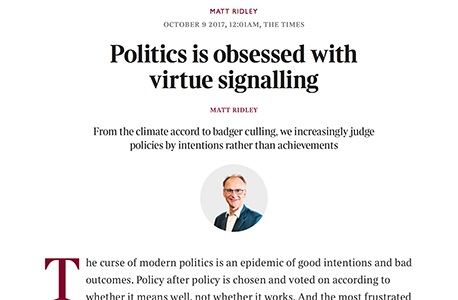Climate change ‘sceptics’ know they have lost the argument, but they are still churning out propaganda

British politicians who promote climate change denial have admitted this week that they have lost the argument, but they are still vigorously disseminating their propaganda anyway.
On 9 October 2017, Viscount Ridley used his regular column in ‘The Times’ to again make inaccurate and misleading claims about climate change. However, his article also included the following concession:
“Yet the truth is, Lord Lawson and I and others like us have so far largely lost the argument on climate change entirely on the grounds of intentions. Being against global warming is a way of saying you care about the future. Not being a headless chicken – however well argue [sic] your case – leads to accusations you do not care.”
Unfortunately for Viscount Ridley, his article exposes the real reason that politicians who promote climate change denial, including so-called “lukewarmers”, have lost the argument – they continually misrepresent the facts.
Viscount Ridley is a Conservative hereditary peer in the House of Lords and a member of the all-male “Academic Advisory Council” of the Global Warming Policy Foundation.
The Foundation was launched as an ‘educational charity’ in 2009 by Lord Lawson of Blaby, another Conservative peer, to campaign against policies to reduce greenhouse gas emissions from fossil fuel use.
Following an investigation by the Charities Commission, the Foundation was forced in 2014 to set up a separate lobbying arm, the Global Warming Policy Forum, to circumvent charity regulations.
Viscount Ridley’s contribution to the Foundation’s campaign includes his column in ‘The Times’, which enjoys the support of the newspaper’s editor, John Witherow, a fellow climate change ‘sceptic’.
The newspaper apparently does not fact-check Viscount Ridley’s articles, and often filters out any letters it receives that criticise his frequently inaccurate and misleading claims.
This week’s column contained many such false claims. He praised Lord Lawson, without disclosing their mutual affiliations to the Foundation, because he has “devoted his retirement to exposing the gap between rhetoric and reality in two great movements: European integration and climate change mitigation”.
Viscount Ridley wrote of Lord Lawson: “In his book, ‘An Appeal to Reason’, he pointed out that on the UN’s official forecasts, climate change, unchecked, would mean the average person will be 8.5 times as rich in 2100 as today, rather than 9.5 times if we stopped the warming”.
This claim in Lord Lawson’s 2008 book is based on bogus economics and has been debunked many times: it assumes that climate change impacts, no matter how damaging, will never affect economic growth.
Similarly, Viscount Ridley’s article stated: “The Paris climate accord is one big virtue-signalling prayer, whose promises, if implemented, would make a difference in the temperature of the atmosphere in 2100 so small it is practically within the measuring error”. This claim is based on a discredited article by Dr Bjorn Lomborg, which assumed that countries will give up reducing their annual emissions of greenhouse gases after 2030, and hence reverse the impact of their ‘nationally determined contributions’ to the Paris Agreement.
And referring to the electricity generated from wind turbines, Viscount Ridley wrote that “its impact on emissions is so small as to be unmeasurable”. This was plainly untrue. A paper published earlier this year in the journal ‘Energy Policy’ by researchers at the University of Edinburgh found that wind power reduced emissions in Great Britain by 35.8 million tonnes of carbon-dioxide-equivalent during the six years between 2009 and 2014.
Despite these inaccurate and misleading claims, ‘The Times’ refused to publish any correspondence from me or others that sought to correct Viscount Ridley’s column. Instead the newspaper printed two letters of praise, including one from the Labour peer Bernard Donoghue, who neglected to mention that he is a trustee of the Global Warming Policy Foundation.
Meanwhile, another trustee of the Foundation, the Labour Member of Parliament Graham Stringer, has refused this week to withdraw false allegations he made about the work of climate researchers in an article in the ‘Daily Mail’ and letter to ‘The Times’ on 20 September.
I wrote to Mr Stringer on 21 September to draw his attention to the many serious errors in his article and letter. In particular, I drew attention to a letter by Professor Myles Allen and the other authors of a paper on ‘Emission budgets and pathways consistent with limiting warming to 1.5 °C’, published by the ‘Daily Mail’ on 21 September, which made an explicit accusation: “Graham Stringer MP misrepresents our study to claim global temperatures are not rising as fast as predicted by the Intergovernmental Panel on Climate Change (IPCC) and suggests that action to reduce greenhouse gas emissions is therefore no longer urgent”.
Mr Stringer responded to my letter with an email message this week. He refused to acknowledge or withdraw any of his false claims, alleging that the paper’s authors had been pressured into challenging Mr Stringer’s misrepresentations of their work.
My letter to Mr Stringer had also asked him to explain why he had cited his membership of the House of Commons Select Committee on Science and Technology in both his article and his letter, but had neglected to mention that he is a trustee of the Global Warming Policy Foundation. I copied my letter to the Chair and Clerk of the Committee. Mr Stringer also copied his response to Lord Lawson and Dr Benny Peiser, the Director of the Foundation.
Mr Stringer’s campaign of misinformation about climate change reflects poorly on him both as a Member of Parliament and as a member of the Select Committee. His antics help to explain why a recent survey by Ipsos-MORI found that 80 per cent of the British public trust scientists to tell the truth, while only 15 per cent trust politicians.
Bob Ward is policy and communications director at the Grantham Research Institute on Climate Change and the Environment at the London School of Economics and Political Science.

